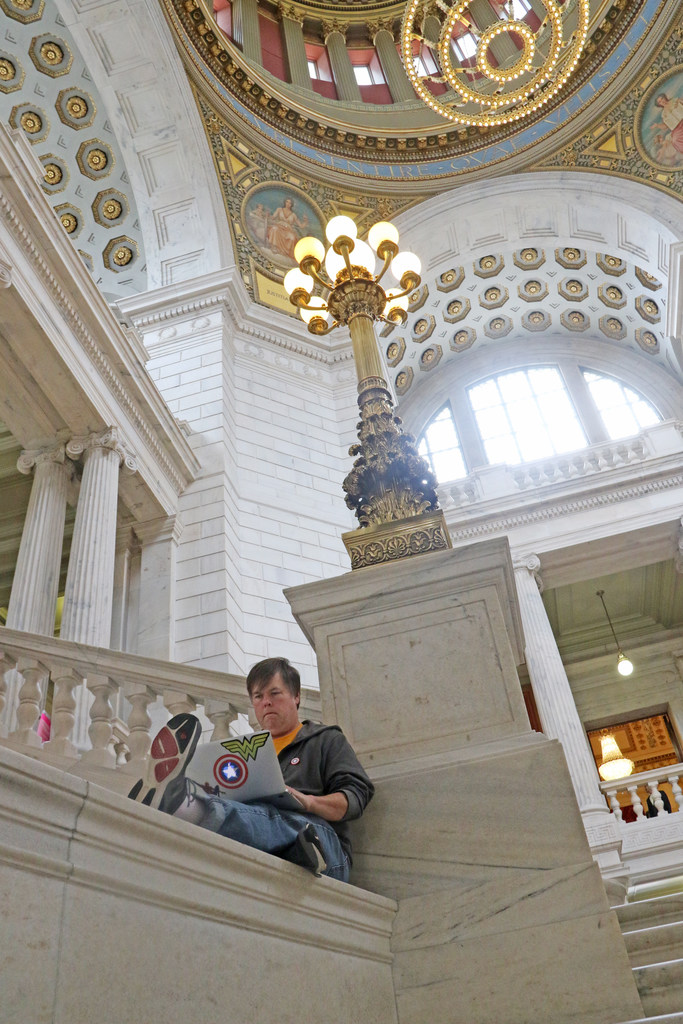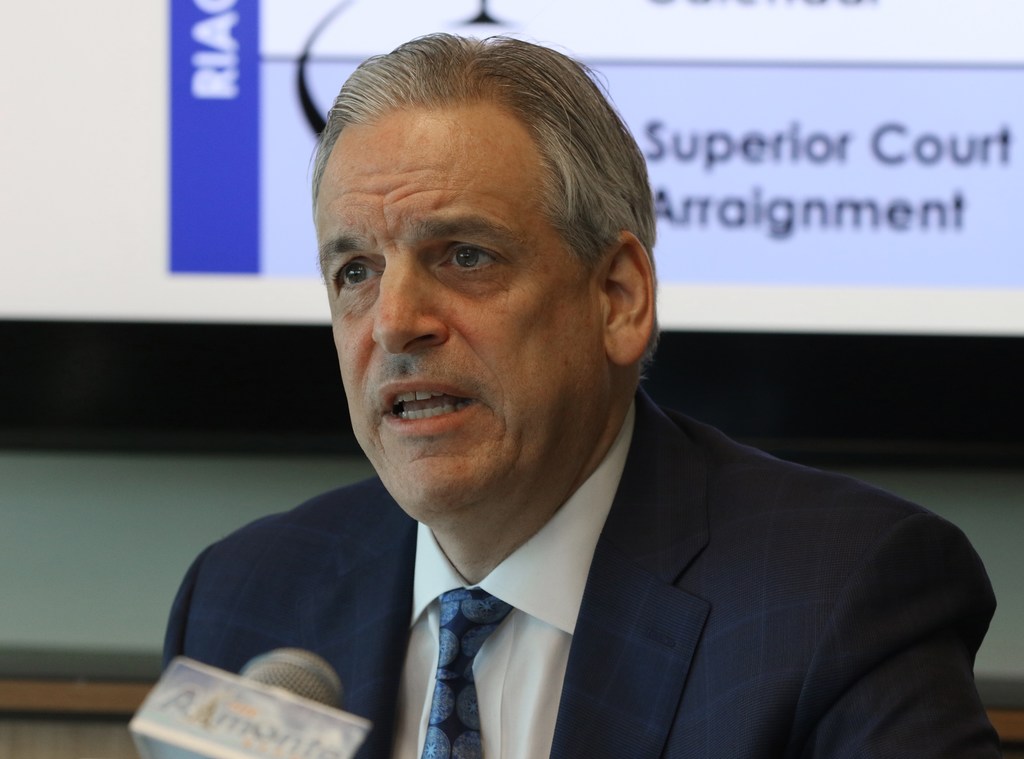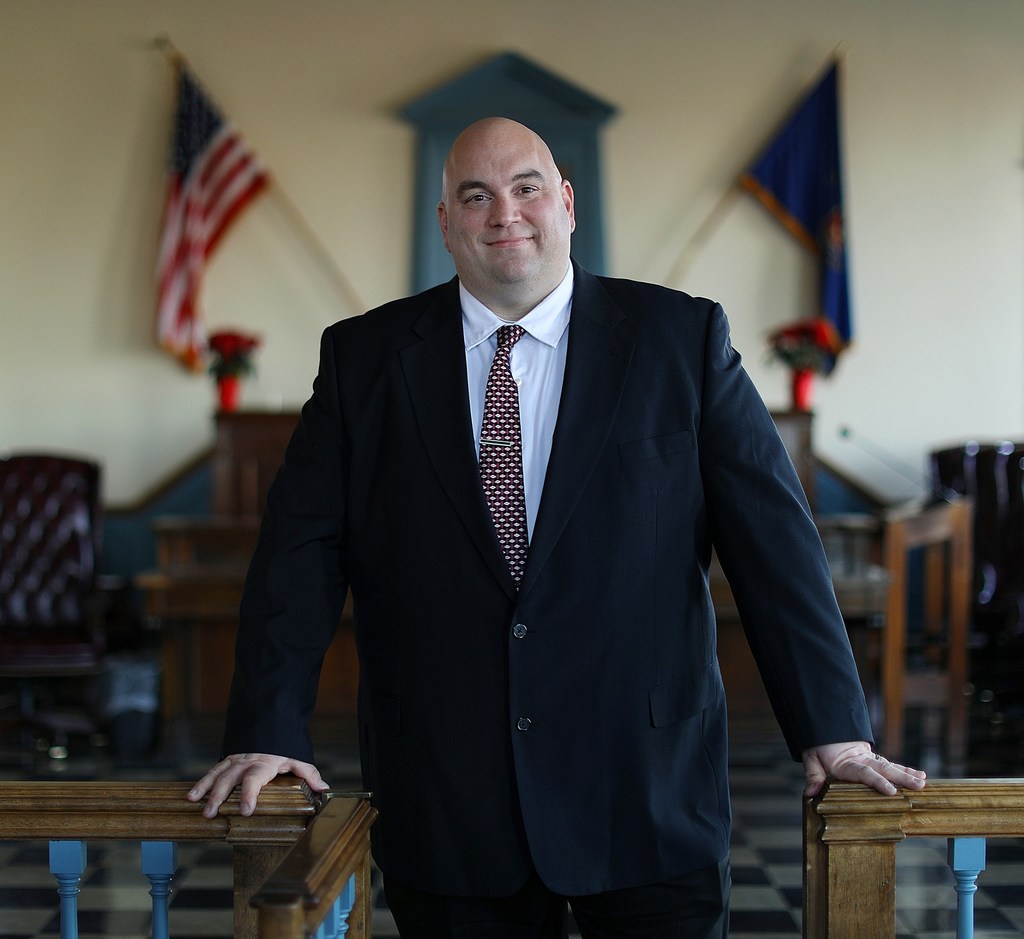
'Ignorance of the law'
Wayne Kezirian, then chairman of the Rhode Island Public Transit Authority, didn’t want the board’s November meeting videotaped. He sent the security officer to deliver the message to the man in the back of the room with a camera tripod.
“You need to turn your camera off,” security officer James Pereira told Steve Ahlquist, a reporter who runs the website Uprise RI.
Ahlquist knows more than most about the state’s Open Meetings Act, a statute that requires public bodies to operate in public view. Each year in Rhode Island, the state attorney general investigates scores of alleged infractions. Since 2011 it has found at least 112 violations. This wouldn’t be the first time Ahlquist would have to stand up for the public’s right.
A year earlier at a Cranston City Council meeting, council President Michael Farina told the chamber audience that recording devices were prohibited. Ahlquist protested: “That’s actually not legal.” Farina cited municipal rule “34b.” Ahlquist continued objecting. Farina said he’d make a one-time exception. Turned out there was no 34b rule on recording meetings.
Understanding the Open Meetings Act
Now here Ahlquist was, having to make another stand.
“This is an open meeting, that means I have the right to record,” Ahlquist told Pereira, who had reached out and turned his camera away from the assembling RIPTA board.
“That’s just access,” said Pereira. “Access to the meeting.”
“Nope,” said Ahlquist, “it’s about recording.”
It’s been more than 30 years since a federal court ruled that Rhode Island's Open Meetings Act authorizes individuals to record public meetings, says Steven Brown of the American Civil Liberties Union of Rhode Island.
Among its many specifics, the law spells out how public meetings must be conducted, from giving 48-hour advance notice of a meeting, to requiring detailed agendas that explain what actual topics will be discussed, to mandating that meeting minutes (the written record of what happened) be kept and posted.
The law grants a few exceptions when a public body can meet in closed or “executive” session — usually to discuss personnel matters or contract negotiations. But even in those cases a body must vote on those private discussions in public view.
Peter Neronha, who became the state’s attorney general in January, says that just because a public body can meet in private at times, doesn’t mean it necessarily should.
“You ought to be thinking about whether you should,” said Neronha, who says he is taking a “different approach” to government transparency issues since succeeding Peter Kilmartin in January. “The more open I am, the more beneficial it is to the public confidence in this office. My personal belief is if I’ve taken an action I ought to be able to articulate why I did it.”
The Open Meetings Act states that "It is essential to the maintenance of a democratic society that public business be performed in an open and public manner and that the citizens be advised of and aware of the performance of public officials and the deliberations and decisions that go into the making of public policy."
Every year across the state, the law is violated.
The reasons vary, says Brown, whose ACLU office is kept busy challenging many of those violations.
“I think some public bodies don’t really care about conforming to the law. Others don’t pay as much attention to it as they should. And some of them,” says Brown, “appear to be related to trying to avoid public scrutiny that might be controversial or embarrassing.”
Types of violations range from school committee members secretly deciding to take action before a meeting, to fire districts that post vague agendas for their meetings — then vote to raise the tax rates for fire service.
Robert Zarnetske is the town manager in South Kingstown. He’s called for more transparency in his town after two recent open meeting violations — one involving the school committee, the other, an economic development subcommittee.
Following the law is important “because it’s the primary way that the public develops confidence and trust in their government,” he says; it’s not enough for a public body to successfully address a community concern if members skirt the Open Meetings Act in the process.
“If people don’t trust how the right answer was arrived at, you can’t build consensus and it’s not going to be effective,” says Zarnetske.

A sampling of infractions, or complaints:
September 2013: The attorney general finds the Pawtucket School Committee violated the Open Meetings Act when members locked the door of an August meeting, preventing a Valley Breeze newspaper reporter from entering.
November 2014: The Cumberland Fire Committee violated the Open Meetings Act when a quorum of the committee met outside of a meeting and “collectively discussed public business,” the attorney general’s office found.
July 2015: The Little Compton School Committee violated the Open Meetings Act when it voted in executive session on appointing a superintendent — then violated the law a second time when it failed to record in its minutes the reason for holding the closed meeting.
January 2016: Bristol’s 4th of July Committee, a body that celebrates democracy like no other, violates the Open Meetings Act when it surprisingly votes on shortening the route of the town’s historic parade without any mention of the proposal on its meeting agenda.
After a week of public excoriation, the committee reversed itself and voted to retain the original 2.4-mile route.
February 2017: Scituate’s newly elected “independent men,” a majority block of four Town Council members that swept into office on the promise of shaking up the status quo, announce they will hold meetings in the morning to expedite some necessary decision-making.
The council’s three Republicans refused to attend the first meeting, saying it didn’t allow for proper public comment and may violate the Open Meetings Act.
May 2017: The South Kingstown School Committee, in a secret coup of sorts, votes 5-2 to oust Alycia Collins as chair and elects Myrna Bizer in her place.
“It was so glaringly obvious” the votes outcome had been predetermined, says Tara Apperson, a parent who attended the meeting. “There was a motion made, it was seconded and voted on without any discussion.
“It was like: what the hell just happened? Are they for real? It was so shady. A lot of people were upset about it. “
Apperson filed a complaint with the attorney general.
In September 2017, the attorney general’s office ruled the committee had violated the Open Meetings Law by engaging in a “rolling quorum,” in which a majority of a body reaches consensus through a series of one-on-one conversations away from public view.
“People still talk about it,” Apperson says. “Transparency in government, that’s a big deal. I don’t want people making decisions about my school that aren’t done in public. We want to be able to trust in the process and trust our elected local officials, and this clearly was a violation that trust.”
Partly because of what happened, says Apperson, at the next election “we overturned the School Committee and elected four progressive women.”
April 2019: Neronha rules that operators of the Wyatt Detention Facility in Central Falls violated the Open Meetings Act in January when they held an "emergency" meeting to approve a $1.5-million loan aimed at preventing the appointment of a receiver. Neronha said the "emergency" did not constitute an unforeseen circumstance.
It is essential to the maintenance of a democratic society that public business be performed in an open and public manner and that the citizens be advised of and aware of the performance of public officials and the deliberations and decisions that go into the making of public policy.
The Open Meetings Act
Rolling quorums have been the way Scituate leaders have done business for years, alleges John Mahoney, one of the town’s “independent men,” and the council’s chairman, until he lost reelection last year.
“The Republican Town Council, which has run this town for decades, would meet faithfully every single Monday before the Thursday [council] meeting and they would make all the decisions then before the Thursday meeting,” contends Mahoney.
But David A. D’Agostino, one of those longtime Republican council members, says those meetings Mahoney talks about were regular monthly meetings of the Republican Town Committee.
“People like to say, ‘Oh, they meet and decide what they’re going to do at the council meeting.’ Well, I don’t get into that because I’m right down the middle,” says D’Agostino.
Yes, at times there is a majority of Town Council members at those Republican Town Committee meetings, D’Agostino says. “But if I see three guys talking and I’m number four [thus making a quorum], I don’t go near anybody. They probably would bring something up.”

Michael Farina, the Cranston City Council president, admits he might have been a bit overzealous in that January 2017 meeting when he tried to stop Ahlquist from tape recording.
It was his first night as chairman. He’d been studying the city’s rules of order and “wanted to go in and enforce all of them. ...It was just a misunderstanding of the rules.”
But a few months later the council proposed an amendment to its rules that was just as illegal, Brown, of the ACLU, wrote in an April 24, 2017 letter.
The amendment, included in “Rule 41,” banned “audio/visual equipment, or other devices” from a council meeting “without express approval by the presiding council member.”
Wrote Brown: “The clear intent and result of this new language is to ban members of the public from recording either aurally or visually. … In short, no permission from a government official is necessary for a person to exercise his or her right under the law to record a public meeting.”
Brown strongly urged the council to revise the rule. It did.
Rule 41 now includes a final sentence: “Under no such circumstances shall the recording of meetings be prohibited unless it violates fire code.”

Kezirian, the former RIPTA chairman, says he had a reason for trying to prevent Ahlquist from videotaping that RIPTA board meeting last November.
Though at the time he tried to make light of the situation — you can hear him after the meeting on Ahlquist’s videotape, saying, “I just, personally, hate the way I sound on tape” — he says he really had some of the bus company’s passengers in mind.
Some of those riders are marginalized, he says, who “literally used their last dollars” to come to the meeting and advocate for why they should be allowed lower or free bus fare.
“They comment on very personal issues: I’m disabled, I lost my husband, I have a disabled child at home. … I personally am quite comfortable with a transcript or audio recording, but I felt when having someone ... stand up and tell those kinds of intimate personal stories, might have prevented us from hearing those comments.”
Further, says Kezirian, “I’m not sure if the law is that clear about videotaping.”
There is no ambiguity in the law, says Brown.
As he wrote in a letter to RIPTA last November: “It has been more than 30 years since a federal court ruled that Rhode Island's Open Meetings Act authorizes individuals to record public meetings. There is thus no excuse for a public body, and particularly a major state agency like RIPTA, to claim ignorance of the law in this regard.”
Ahlquist says the Open Meetings Act isn’t a petty issue. Public officials sometimes “want to make it a petty issue, but it’s not.”
It is the public’s access to their democracy.
“My real concern about this is, if you don’t know the law, like an inexperienced reporter or someone from the public, you could be easily intimidated by this kind of strong-arm tactics” — like someone saying you can’t videotape a public meeting.
“Freedom of information is for everyone.”